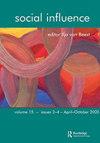政治的语言:社交媒体和国会沟通中的意识形态差异
IF 0.6
3区 心理学
Q3 PSYCHOLOGY, SOCIAL
引用次数: 8
摘要
政治心理学的理论和研究大多基于普通公民的自我报告研究,认为自由主义者和保守主义者在人格特征、价值优先、认知风格和动机倾向方面存在差异。这些心理特征可以通过文本分析进行不显眼的研究,这在调查政治精英的特征时尤其有价值,尽管他们对理解意识形态动态很重要,但他们的特征很难研究。在本研究项目中,我们使用语言调查和单词计数(LIWC)软件分析了279-388名美国国会议员在Twitter (n = 88,874条推文)、Facebook (n = 15,636条帖子)和国会(n = 6,159次演讲)上使用的语言,时间跨度为四个月(2014年2月9日至5月28日)。与基于普通公民的调查结果一致,我们观察到保守派立法者更多地使用与宗教、权力、威胁、抑制、风险以及——在国会——传统和抵制变革有关的语言。相反,自由派立法者更多地使用与隶属关系、成就、仁慈、一般情感、“社会”关注以及——在国会——普遍主义、刺激和享乐主义有关的语言。本文讨论了政治心理语言学在不同平台上交流模式的意识形态和语境变化,以及普通公民和政治精英使用的语言差异。本文章由计算机程序翻译,如有差异,请以英文原文为准。
The language of politics: ideological differences in congressional communication on social media and the floor of Congress
ABSTRACT Theory and research in political psychology, most of which is based on self-report studies of ordinary citizens, suggests that liberals and conservatives differ in terms of personality traits, value priorities, cognitive styles, and motivational tendencies. These psychological characteristics may be studied unobtrusively through the use of text analysis, which is especially valuable when it comes to investigating the characteristics of political elites, who are otherwise extremely difficult to study, despite their importance for understanding ideological dynamics. In the present research program we used Linguistic Inquiry and Word Count (LIWC) software to analyze the language used by 279–388 members of the U.S. Congress on Twitter (n = 88,874 tweets), Facebook (n = 15,636 posts), and the floor of Congress (n = 6,159 speeches) over the same four-month period (February 9–May 28, 2014). Consistent with findings based on ordinary citizens, we observed that conservative legislators used more language pertaining to religion, power, threat, inhibition, risk and – on the floor of Congress – tradition and resistance to change. Conversely, liberal legislators used more language pertaining to affiliation, achievement, benevolence, emotion in general, ‘social’ concerns and – on the floor of Congress – universalism, stimulation, and hedonism. Implications for the study of political psycholinguistics focusing on ideological and contextual variability in communication patterns on various platforms are discussed, as are differences in language used by ordinary citizens and political elites.
求助全文
通过发布文献求助,成功后即可免费获取论文全文。
去求助
来源期刊

Social Influence
PSYCHOLOGY, SOCIAL-
CiteScore
1.50
自引率
0.00%
发文量
4
期刊介绍:
Social Influence is a journal that provides an integrated focus for research into this important, dynamic, and multi-disciplinary field. Topics covered include: conformity, norms, social influence tactics such as norm of reciprocity, authority, scarcity, interpersonal influence, persuasion, power, advertising, mass media effects, political persuasion, propaganda, comparative influence, compliance, minority influence, influence in groups, cultic influence, social movements, social contagions, rumors, resistance to influence, influence across cultures, and the history of influence research.
 求助内容:
求助内容: 应助结果提醒方式:
应助结果提醒方式:


